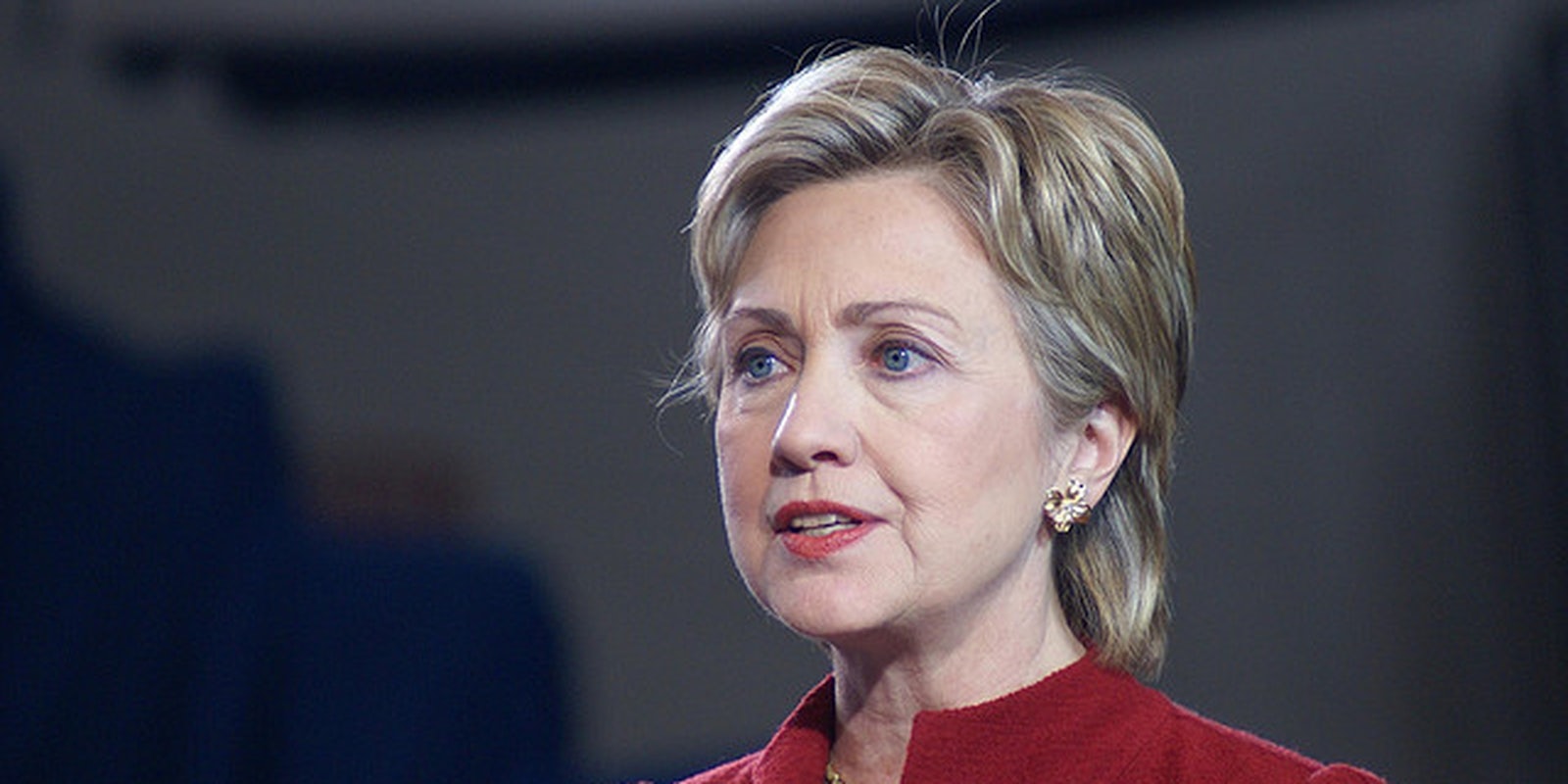When it comes to the black community, Hillary Clinton may not be ready for primetime.
Clinton may have scored a few points here and there during recent speeches, calling out the injustices of the prison-industrial complex and calling the Charleston, South Carolina, shooting an act of terrorism. But when she spoke at a Florissant, Missouri, church Tuesday evening—a predominantly black church—Clinton made a major misstep during an otherwise compelling talk about race and inequality in America.
As the Huffington Post reports, Clinton’s remarks at the Christ the King United Church of Christ included reflection upon her recently deceased mother’s struggle to survive after being abandoned by her parents. Clinton said her mother’s experience influenced her upbringing, during which she was taught the importance of “kindness along the way from someone who believe she mattered.” That’s when she uttered a familiar, yet dreaded phrase: “All lives matter.”
For an attempt to connect with black voters, Clinton’s word choice is a major fail. As a white woman, one who seeks to build a bridge with a community that didn’t support her during the 2008 presidential election, it’s not the best idea to overidentify her own unique struggle with those of her would-be black constituents. Her experience in America will indeed differ from those of blacks in a St. Louis suburb—people residing not far from the site of massive protest in Ferguson last August. Clinton attempted to show solidarity as an ally, but in a way that’s disingenuous.
All lives indeed have value, but the issue being posed by the #BlackLivesMatter movement is how, within every major institution, black lives have been devalued for generations.
“Clinton wants credit for race activism and allyship which she hasn’t earned. Her pandering to White voters, while at times using the language of Black activists, shows how unfamiliar, uncomfortable, and unaware she is about actual issues facing Black and brown folks in this country.” Jenn M. Jackson writes at the Black Youth Project. “Hillary Clinton’s words, during times like these, represent and reflect many of the sentiments of those who will vote for her. Her inability to really address the issues facing Black communities speaks to a larger, societal issue with grappling with our very real and very present problems with racism, violence, and exclusion of Black people from the public sphere.”
At present, “all lives matter” is what we know to be inherently true. All lives indeed have value, but the issue being posed by the #BlackLivesMatter movement is how, within every major institution, black lives have been devalued for generations. In that sense, “all lives matter” is aspirational in the realm of public policy, but it is not yet a reality. Anyone who asserts that “all lives matter” might be optimistic and truly care about their fellow citizens, but that statement is a misrepresentation of the status quo. Until people in power establish policies with the baseline assumption that black lives are as important as white lives, statements like “all lives matter” gloss over the gross, historical injustice done to black people.
As #BlackLivesMatter cofounder Alicia Garza wrote in an October essay for the Feminist Wire, “Black Lives Matter is an ideological and political intervention in a world where black lives are systematically and intentionally targeted for demise. It is an affirmation of Black folks’ contributions to this society, our humanity, and our resilience in the face of deadly oppression.” Garza, along with two other black queer women, collaborated with others to develop the network and infrastructure for the #BlackLivesMatter movement as we know it. But, as she noted, it hasn’t stopped people from co-opting the work or changing the phrase to”All lives matter”:
When we deploy “All Lives Matter” as to correct an intervention specifically created to address anti-blackness, we lose the ways in which the state apparatus has built a program of genocide and repression mostly on the backs of Black people—beginning with the theft of millions of people for free labor—and then adapted it to control, murder, and profit off of other communities of color and immigrant communities. We perpetuate a level of White supremacist domination by reproducing a tired trope that we are all the same, rather than acknowledging that non-Black oppressed people in this country are both impacted by racism and domination, and simultaneously, benefit from anti-black racism.
This is why Clinton’s use of the phrase will draw ire from the black community for weeks to come. Instead of positioning herself as the candidate best suited to incorporate the needs of the black community into her platform, Clinton’s use of “all lives matter” shows she can’t express solidarity with black people without feeling as though she’s taking something away from her white voter base. Clinton may fear that “black lives matter” will isolate white voters and others who would then perceive her as the “black” candidate, rather than as a candidate who cares about the general American population. In this case, “all lives matter” is more than a clueless mistake. As is everything during a political campaign, her Tuesday remarks were part of a deliberate, calculated appeal to a black constituency.
Clinton’s words and actions matter—and she can keep anything that’s less than authenticity and true solidarity.
Photo via Marc Nozell/Flickr (CC BY 2.0)


